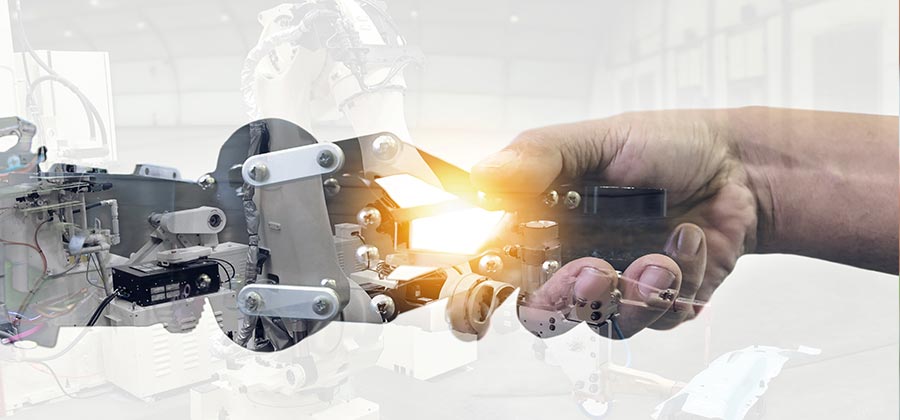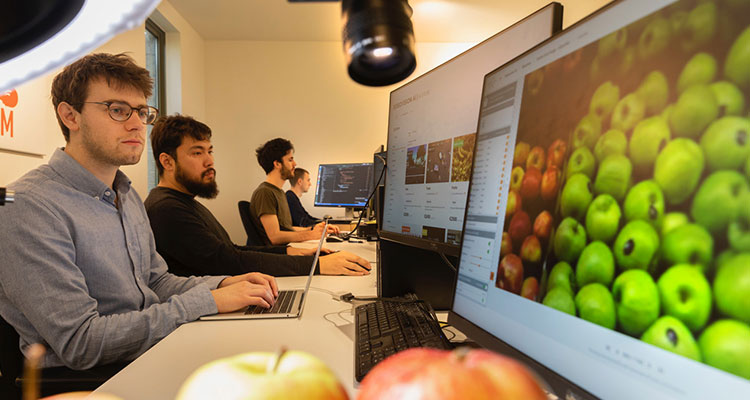The factory of the future is likely to draw on artificial intelligence to get robots working optimally with their human colleagues on a production run.

In the years to come, human beings will be working more and more frequently alongside robots. However, this approach will not necessarily prove free of difficulties. Accordingly, the Corporate Technology arm of German multinational engineering group Siemens has been working on an artificial intelligence (AI)-based system to oil the wheels of human-machine collaboration. This software programme - first designed for Siemens’ clients as a production-as-service software - is now used in one of Siemens’ factories to allocate tasks to the human and robot resources and plan their mutual cooperation.
The programme, entitled Click2Make, takes account of the available resources and skills at a manufacturing plant – including details such as whether a human technician is left- or right-handed and his/her preferred language for communication – so as to optimise teamwork.
The AI-based system could for instance ask a machine to bring a human worker various parts for assembly. Then this new-generation shift foreman would verify that all relevant safety conditions are being followed, including coming to the aid of a flesh-and-blood team-member who is trying to lift an object that is too heavy for him/her. As the movements of human beings are rather less precise and predictable than those of robots, the factory of the future will in addition be equipped with video cameras to track all movements with a view to avoiding any collisions.
Some experts, such as Mélanie Cook, Head of Strategy at corporate organisation consultancy SapientRazorfish, argue that Man ought to collaborate with Machine in a spirit of ‘intelligence augmentation’ – which is exactly what is likely to happen in the futuristic factory envisaged by Siemens. But what will happen if robots become too skilled and too autonomous? All the more reason for human employees to concentrate on areas in which they are most gifted, such as imagination, creativity and emotional intelligence, insists Management Consultant John Hagel, whose work as Co-Chairman of Deloitte’s ‘Centre for the Edge’ focuses on such questions.
Source: L’Atelier
16.12.2024
The digital divide persists
“It's not just the elderly who lack digital skills, young people and workers are also affected,” says Linde Verheyden, Director Public Affairs at BNP Paribas Fortis and Chair of DigitAll.
Despite the acceleration in digitalisation, many people are being left behind. In Belgium, 40% of the population between the ages of 16 and 74 are at risk of digital exclusion. Although older people are often seen as the most vulnerable group, younger people are also struggling in the digital age. Among young people aged between 16 and 24, almost a third lack basic digital skills, with a peak of 52% among those with a low educational attainment.
Figures that are surprising to say the least, considering young people grow up surrounded by digital tools.
"People often assume that young people are digital natives because they are adept at using social media. But making a TikTok video or scrolling through your Instagram feed doesn't necessarily mean you know how to carry out online banking transactions or complete an application form.
Does poverty play a significant role in the digital divide?
"Absolutely. For 25% of people living in poverty, a smartphone is their only digital device. Although they provide a basic form of access, smartphones are often inadequate for important tasks such as preparing a CV or filing a tax return. Without a computer or a stable internet connection, many digital opportunities remain out of reach for those who don't have access to these tools.
What are the other reasons for this digital divide?
"People often lack the necessary basic digital skills because they never learned them. They may not know how to use a search engine, attach a file to an e-mail, or download an app. Without this knowledge, the digital world becomes inaccessible. Furthermore, there is also the issue of digital stress. Many people worry about making mistakes, being hacked, or their privacy. Some people deliberately choose not to use digital services even though they have the skills. Technology instils a sense of distrust and unrest in them, creating a significant barrier.”
How can companies help close this gap?
"Companies can play a key role on several levels. In addition to being a social problem, digital exclusion is also an economic challenge. Today, less digitally adept individuals are both customers and potential employees. Being aware of this as a company is the most important first step. But it’s also essential to provide support to your staff. For example, employees at the municipal parks and greenery service in Ghent received training on how to file their tax returns online. These kinds of initiatives give people practical skills and confidence. In addition, companies need to do a digital check. To measure is to know. Just because someone uses a laptop daily, it doesn’t mean they have digital skills."
What does BNP Paribas Fortis do specifically to promote digital inclusion?
"We have launched several initiatives. In 2020, we established DigitAll, a platform for sharing knowledge and best practices around digital inclusion. Today, we bring together more than 130 organisations. DigitAll has developed a range of tools, including a checklist that companies can use to test how accessible their apps and websites are. A simple interface can make the difference between joining or dropping out for people who are less digitally adept. Since 2021, the bank has also supported a chair at the VUB that investigates the link between digital inclusion and human rights."
How important are tools in bridging the digital divide?
"User-friendly tools are a must. We have partnered with Emporia, a manufacturer of user-friendly smartphones for the less digitally adept. We pre-install our app for customers who buy one of their smartphones."
We mentioned digital stress earlier. How can you mitigate this?
"With awareness campaigns. We want our customers to use our tools with confidence. The bank also takes its less digitally adept customers into account. Thanks to our partnership with bpost, all our customers can go to their local post office for all basic banking transactions."
Do companies stand to benefit from promoting digital inclusion?
"They do. Digital inclusion requires a sustained effort from all stakeholders, including governments and educational institutions. No one should be left behind. Companies that act now can contribute to a more inclusive society while also securing their own future in an increasingly digital world.”
“Without key digital skills, many digital opportunities remain out of reach.”
“A simple interface can make the difference between joining or dropping out for people who are less digitally adept.”
“Limited digital skills remain an obstacle to closing the digital divide.”
Linde Verheyden, Director Public Affairs at BNP Paribas Fortis and Chairman of DigitAll
04.01.2021
Robovision: “Within five years artificial intelligence will have become omnipresent”
Robovision has emerged as the best-known AI player in the Benelux countries. However, this young firm has an even more extensive vision. “Healthcare, agriculture, the environment… within five years artificial intelligence will have become omnipresent,” foresees CEO Jonathan Berte. BNP Paribas Fortis is an important partner in their growth.

Jonathan Berte, who trained as a civil engineer, smiles as he thinks back to the pioneering years at Robovision. “In fact, when I was a kid I had a really analytical mindset. In the scouts and at school I used to keep note of absolutely everything. It was really important for me to collect information. I was a kind of ‘infoholic’. But just gathering information gets you nowhere. That also goes for information that’s just stored on hard disks. The added value comes from using that information efficiently.”
How exactly do you do that at Robovision?
“Technology is evolving at lightning speed. These days just about everybody has a smartphone in their trouser pocket. Apart from anything else, these devices create a great deal of information, so we need to keep up on the algorithmic front and artificial intelligence helps us with that. That’s how we can provide governments, institutions and companies large and small with a platform for automated decision-making on the basis of visual data. In addition we constantly ask ourselves how we can democratise artificial intelligence. So in a way we’re like the Airbnb of artificial intelligence.”
What might that visual data be for example?
“In May, in collaboration with the University of Antwerp and security firm Securitas, we set up a smart camera in a shopping street in order to measure to what extent people were complying with social distancing requirements. This is important information for the decision makers in this country. Of course we don’t have to look through the images ourselves. We get them analysed using a specific type of artificial intelligence – self-teaching algorithms or what are known as neural networks. They’re designed somewhat along the lines of our own brains, though not nearly as complex.”
Which brings us to the fashionable expression ‘deep learning’. Are machines eventually going to make themselves smarter than us humans?
“Oh, that’s already underway at this very moment – in radiology, among other fields, plus also in games. Remember the legendary Go match between South Korean grandmaster Lee Sedol and a computer, which was beautifully represented in the 2017 documentary film AlphaGo? We’re also focusing on deep learning, because neural networks are very efficient at dealing with visual data. However, it will be some time yet before AI can equal a human being in intuition for instance.”
You’ve now evolved from a startup to a scaleup. Where do you want to be in five years’ time?
“The society of tomorrow will be one in which everything will be properly measured and dealt with. For instance, we’re also working in the field of horticulture, where AI can be applied in quality control – to spot fruit with an abnormal shape or colour, say. Lots of agricultural and horticultural businesses have got into difficulties over the last few months because pickers from Eastern Europe weren’t able to enter this country. Those businesses will very probably be investing in AI and automation over the next few years. In these kinds of fields, the coronavirus has taken us to a digital society almost overnight.”
What sort of partners do you need in order to succeed in your aims?
“During our growth from startup to scaleup, BNP Paribas Fortis has always been an important partner. You have really taken a lot of trouble to understand our story. Of course you do need to grasp our plans from a banking standpoint in order to be able to assess the risks. But quite apart from that, I have the feeling that you’re particularly good when it comes to supporting the whole tech and startup scene.”
30.04.2020
#StrongerTogether Biogazelle plays part in fight against coronavirus
Biogazelle is playing a huge role in the shared battle against the coronavirus. In record time, the Ghent biotech company has developed a test for detecting infections.
Since 2007, Biogazelle has offered support to the pharmaceutical and medical industries. The company develops revolutionary techniques for tasks such as detecting new illnesses, multiplying tiny amounts of genetic material to create analysable samples.
“In just 10 days, we have come up with an extremely sensitive coronavirus detection test,” says CEO Mieke Van Acker. “Our speed and flexibility have amazed the big pharma companies. We started with 2,000 tests a day, and that number has already shot up. But we are still a long way from our limit.”
Unprecedented collaboration
To drive capacity even further, Biogazelle has invested in a robot. “Very soon this will automate certain manual operations,” the CEO explains. “Inactivation of the virus is currently done manually. By automating this step in the process, we will significantly increase efficiency.”
Biogazelle is part of a coronavirus consortium established by minister Philippe De Backer that also includes three large pharma companies and a university. “We are joining forces to further increase the testing capacity in our country,” says Mieke Van Acker. “Such a collaboration is unprecedented.”
Every link is crucial
According to Van Acker, every link in the chain is equally important. “We ourselves are supported by Ghent University, UZ Gent and the Flemish Institute for Biotechnology. We have help from volunteers, and industry colleagues have also offered test apparatus.
But the financial support from BNP Paribas Fortis is as valuable as the scientific aspect.” This financial support consists of a credit line and leasing agreement. Biogazelle will also make use of BNP Paribas Fortis Factor, a series of solutions aimed at optimising work capital and the resulting financial needs.
09.10.2018
How to prevent a stroke with the help of your smartphone
Fibricheck is a medical application that anticipates strokes using just a smartphone. This kind of innovation focused on human well-being is at the heart of BNP Paribas Fortis’s sustainability strategy.

Digitalisation is affecting even medicine. Convinced that the digital world and the traditional medical world must work together, Fibricheck has developed an application to anticipate strokes. This ethos makes human interests a core concern.
By supporting this Belgian company, BNP Paribas Fortis wants to do its bit to build a more sustainable world and help new and inspiring ideas to emerge.
A diagnosis using your smartphone
Smartphones are becoming increasingly important in our everyday lives. We use them to communicate, cook and read... so why not for medical diagnosis? With Fibricheck, the user can now check their heartbeat, to anticipate the risks of a stroke. The Fibricheck application focuses on the most common kind of heart arrhythmia: atrial fibrillation, which is responsible for 20% of strokes.
How does it work?
Above all, it is important to know that Fibricheck is available only by medical prescription. Once you have installed it, you just need to put your finger on your smartphone camera for 60 seconds, for all the required data to be recorded. The algorithms will do the rest, to provide an instant result. If any anomalies are detected, the results will be analysed by a Fibricheck doctor and made available to your doctor. Technology is used to serve human interests.
An irregular heartbeat is not always easy to detect. The advantage of Fibricheck is that it does not need to be used in a specific place (e.g. at the doctor's surgery), or during a set period. It allows multiple measurements to be taken, to provide an overview of your heartbeat.
Checks in companies
The health of your employees is crucial. Heart arrhythmias do not always have clear, visible symptoms. Consequently, detection plays a crucial role in preventing the greatest risks. This is why Fibricheck is offering to check your employees.
For more information, consult the Fibricheck website.
Must reads
- Factory of the future will help people and robots to work together
- The digital divide persists
- Robovision: “Within five years artificial intelligence will have become omnipresent”
- #StrongerTogether Biogazelle plays part in fight against coronavirus
- How to prevent a stroke with the help of your smartphone
